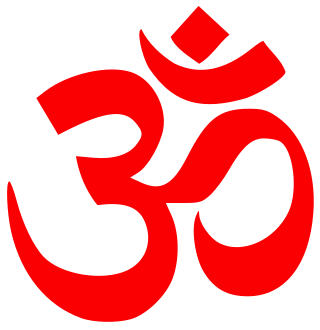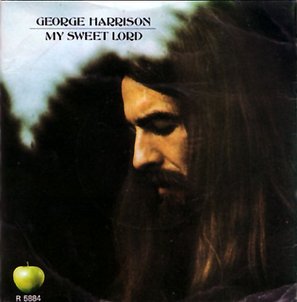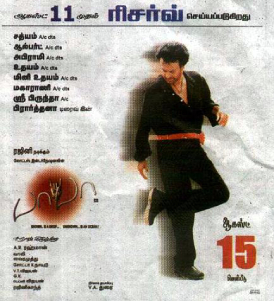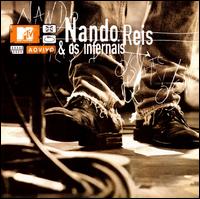Mantra Recordings was a subsidiary of Beggars Banquet Records.
Mantra Recordings was a subsidiary of Beggars Banquet Records.

The Hare Krishna mantra, also referred to reverentially as the Mahā-mantra, is a 16-word Vaishnava mantra mentioned in the Kali-Saṇṭāraṇa Upaniṣad. In the 15th century, it rose to importance in the Bhakti movement following the teachings of Chaitanya Mahaprabhu. This mantra is composed of three Sanskrit names – "Krishna", "Rama", and "Hare".

A mantra or mantram is a sacred utterance, a numinous sound, a syllable, word or phonemes, or group of words believed by practitioners to have religious, magical or spiritual powers. Some mantras have a syntactic structure and a literal meaning, while others do not.

Gorky's Zygotic Mynci were a psychedelic folk and alternative rock band which formed in Carmarthen, Wales, in 1991. The group performed music in both Welsh and English, and they had eight Top 75 singles on the UK Singles Chart during their career. They were prominent during the era known as Cool Cymru. The group disbanded in May 2006.

"My Sweet Lord" is a song by English musician George Harrison, released in November 1970 on his triple album All Things Must Pass. It was also released as a single, Harrison's first as a solo artist, and topped charts worldwide; it was the biggest-selling single of 1971 in the UK. In America and Britain, the song was the first number-one single by an ex-Beatle. Harrison originally gave the song to his fellow Apple Records artist Billy Preston to record; this version, which Harrison co-produced, appeared on Preston's Encouraging Words album in September 1970.
Popol Vuh were a German musical collective founded by keyboardist Florian Fricke in 1969 together with Frank Fiedler, Holger Trülzsch (percussion), and Bettina Fricke. Other important members during the next two decades included Djong Yun, Renate Knaup, Conny Veit, Daniel Fichelscher, Klaus Wiese, and Robert Eliscu. The band took its name from the Mayan manuscript containing the mythology of highland Guatemala's K'iche' people.
The Kali-Santarana Upanishad, also called Kalisantaraṇopaniṣad, is a Sanskrit text. It is a minor Upanishad of Hinduism.

Mantra is a composition by the German composer Karlheinz Stockhausen. It was composed in 1970 and premiered in autumn of the same year at the Donaueschingen Festival. The work is scored for two ring-modulated pianos; each player is also equipped with a chromatic set of crotales and a wood block, and one player is equipped with a short-wave radio producing morse code or a magnetic tape recording of morse code. In his catalogue of works, the composer designated it as work number 32.

The Interzone Mantras is the sixth album by Canadian rock group The Tea Party, released in 2001. Named after William S. Burroughs' book of short stories Interzone and the band's interest in eastern mysticism and esoteric philosophies, the songwriting on The Interzone Mantras builds on the subtle electronica and ballads of Triptych, whilst returning to the familiar territory of their earlier albums with 1970s rock and world music influences. Jeff Martin explained that the album was a return to basics:
"The last two records, Transmission and Triptych, were very much creations of the studio - meticulously built. With this record we felt that we wanted to put a spark of passion underneath our asses.
"So many people have told us that we're this great live rock band, and I just wanted to see if, as producer, I could capture that on this record. I put us in a rehearsal space, the three of us, faced each other with just guitar, bass and drums - no toys - and, you know, 'let's Rock!'" The new approach fired the band up to such an extent that the album was recorded in just twenty days - "unheard of" for The Tea Party, Martin says.Martin has special praise for drummer Jeff Burrows, who he proudly proclaims to be "THE best rock drummer going", and who did every drum track in one take.

Sūryaprabha is a bodhisattva whose specialty is sunlight and good health. Sūryaprabha is often seen with Candraprabha, as the two siblings serve Bhaiṣajyaguru. Statues of the two closely resemble each other and are commonly found together, sometimes flanking temple doors. They are also recognized in mainland Asia as devas.
Mantra means a religious syllable or poem in Sanskrit and Pali.

Three Mantras is the second studio album by English band Cabaret Voltaire. It was released in May 1980 by Rough Trade.

Baba is a 2002 Indian Tamil-language supernatural action film written and produced by Rajinikanth under his banner Lotus International, directed by Suresh Krissna, with cinematography by Chota K. Naidu. Along with Rajinikanth in the title role and Manisha Koirala in the female lead, the film features an ensemble supporting cast. Amrish Puri makes his appearance in a Tamil film for the second and final time after Thalapathi (1991). The original songs and background score were composed by A.R. Rahman.

MTV Ao Vivo is the first live album released by Brazilian band Nando Reis e os Infernais.

Mantra of Love is an album by Acid Mothers Temple & The Melting Paraiso U.F.O., released in 2004 by Alien8 Recordings.
Nyasa is a concept in Hinduism. It involves touching various parts of the body while chanting specific portions of a mantra. This imposition of mantras upon the body is considered as the assigning or locating of divinity inside one's own body. For example, nyasa is part of the equipment of a sculptor as a sādhaka and yogi.

Blood Mantra is the sixth studio album by Polish death metal band Decapitated. It was released on 22 September 2014 in Poland via Mystic Production and later in September via Nuclear Blast Records in other regions. Blood Mantra was produced by Wojtek and Sławek Wiesławscy. It is the band's first album to feature drummer Michał Łysejko and their only album to feature bassist Paweł Pasek. The song "The Blasphemous Psalm to the Dummy God Creation" was released as a single on 8 August 2014. Two days earlier, the single was released as digital stream on Nuclear Blast YouTube profile.

The Radha Krsna Temple is a 1971 album of Hindu devotional songs recorded by the UK branch of the Hare Krishna movement – more formally, the International Society for Krishna Consciousness (ISKCON) – who received the artist credit of "Radha Krishna Temple (London)". The album was produced by George Harrison and released on the Beatles' Apple record label. It compiles two hit singles, "Hare Krishna Mantra" and "Govinda", with other Sanskrit-worded mantras and prayers that the Temple devotees recorded with Harrison from July 1969 onwards.

Songs of Innocence and Experience is an album by American beat poet and writer Allen Ginsberg, recorded in 1969. For the recording, Ginsberg sang pieces from 18th-century English poet William Blake's illustrated poetry collection of the same name and set them to a folk-based instrumental idiom, featuring simple melodies and accompaniment performed with a host of jazz musicians. Among the album's contributors were trumpeter Don Cherry, arranger/pianist Bob Dorough, multi-instrumentalist Jon Sholle, drummer Elvin Jones, and Peter Orlovsky – Ginsberg's life-partner and fellow poet – who contributed vocals and helped produce the recording with British underground writer Barry Miles.
"Selfish" is a song by American rapper Future for his sixth studio album, Hndrxx (2017), featuring Barbadian singer Rihanna, the song was released as the lead single from Hndrxx on February 28, 2017. The track was produced by Detail, Major Seven and Mantra.

"Mantra" is a song by British rock band Bring Me the Horizon. Produced by the band's vocalist Oliver Sykes and keyboardist Jordan Fish, it is featured on the group's 2019 sixth studio album Amo. The track was released as the lead single from the album on 21 August 2018, topping the UK Rock & Metal Singles Chart and spending three weeks at that spot.